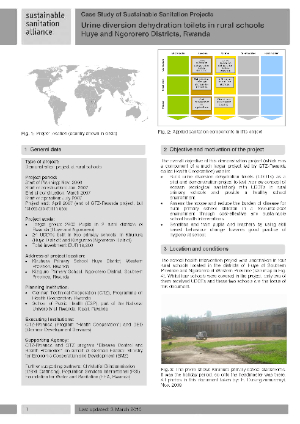Urine diversion dehydration toilets in rural schools Huye and Ngororero Districts, Rwanda - Case study of sustainable sanitation projects
Dusingizumuremyi, E. (2010)

Published in: 2010
Publisher:
Sustainable Sanitation Alliance (SuSanA)
Author:
Dusingizumuremyi, E.
Uploaded by:
SuSanA secretariat
Partner profile:
common upload
11138 Views
166 Downloads
Location of library entry
Content - Summary
This case study is a about a demonstration project at rural schools in Rwanda. 24 UDDTs were constructed in 2 primary schools serving approximately 2800 pupils.
The overall objective of this demonstration project (which was a component of a much larger project led by GTZ-Rwanda called Health Cooperation) was to:
· Build urine diversion dehydration toilets (UDDTs) as a pilot and demonstration project to test the new concept of ecosan (ecological sanitation) with UDDTs in rural primary schools and provide a healthy school environment.
· Assess the scope and reduce the burden of disease for rural primary school children in a resource-poor environment through cost-effective and sustainable school health interventions.
· Sensitise and train pupils and teachers by using skill based behaviour change towards good practice of hygiene at school.
Operation and maintenance activities in the two schools with UDDTs include:
· Keeping the toilets clean
· Covering the faeces after defecation with ash as drying material (done by the users; ash is brought by pupils every day)
· Monitoring the level of urine and faeces in the collection containers and vaults (this is done by the “school guards” who also transport the dried faeces to the fields).
With regards to long-term impacts of the project the following
can be concluded:
1. The main expected impact of the project was to improve public health and in particular to reduce the rate of diarrhoea incidences in school children. UDDTs are a preventive tool to lower disease and parasite infestation (intestinal worms). But no data is available on actual
intestinal worms’ reduction.
2. The new school toilets reduced the toilet queues, as well as bad smell at the two schools.
3. The demonstration UDDTs have not yet resulted in any upscaling activities for ecosan systems by the schools or by the Ministry of Education.
Bibliographic information
Dusingizumuremyi, E. (2010). Urine diversion dehydration toilets in rural schools Huye and Ngororero Districts, Rwanda - Case study of sustainable sanitation projects. Sustainable Sanitation Alliance (SuSanA)
Filter tags
Case studies in SuSanA template English Faeces or faecal sludge Rural Schools Sub-Saharan Africa Urine Urine diversion dehydration toilets (UDDTs)














